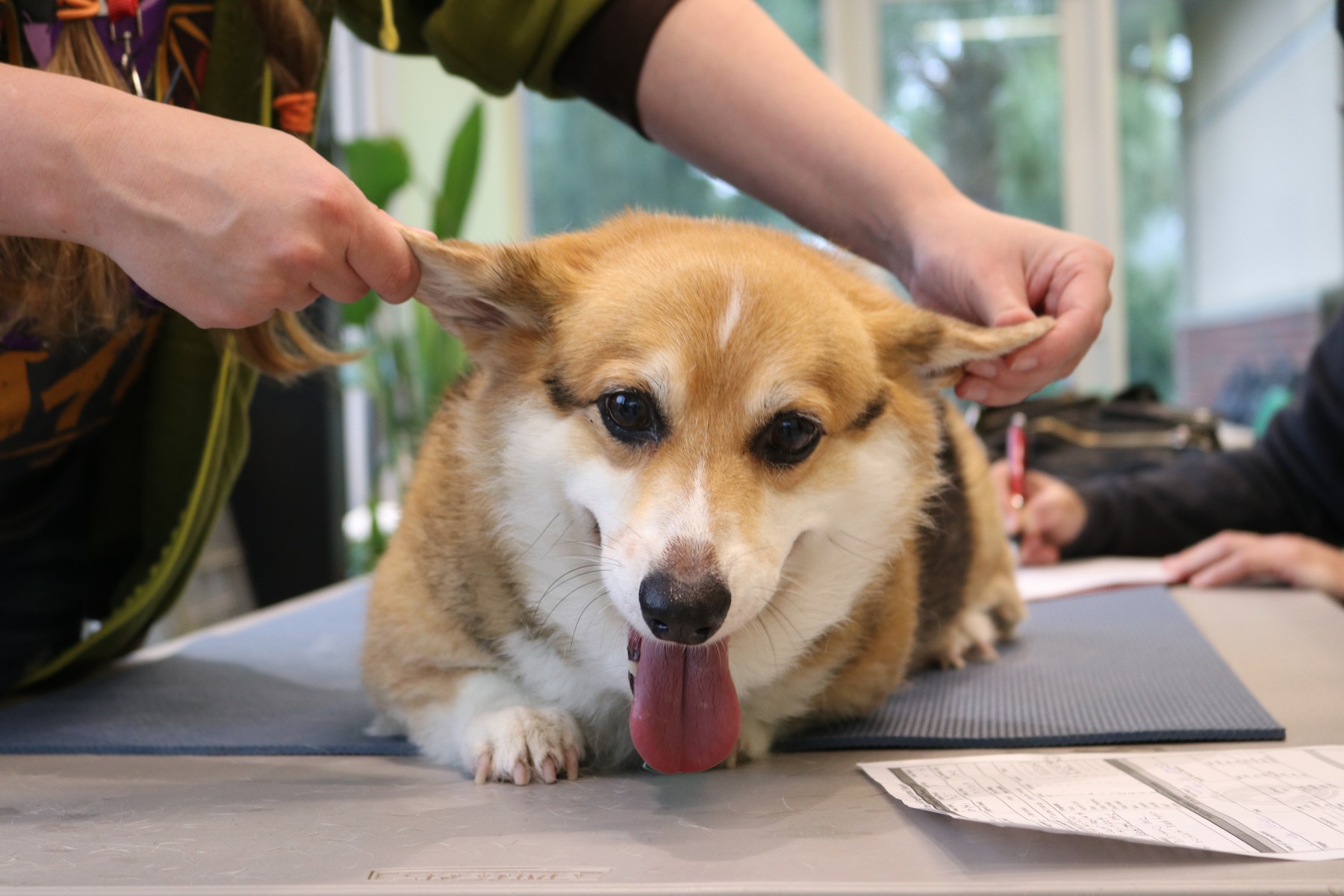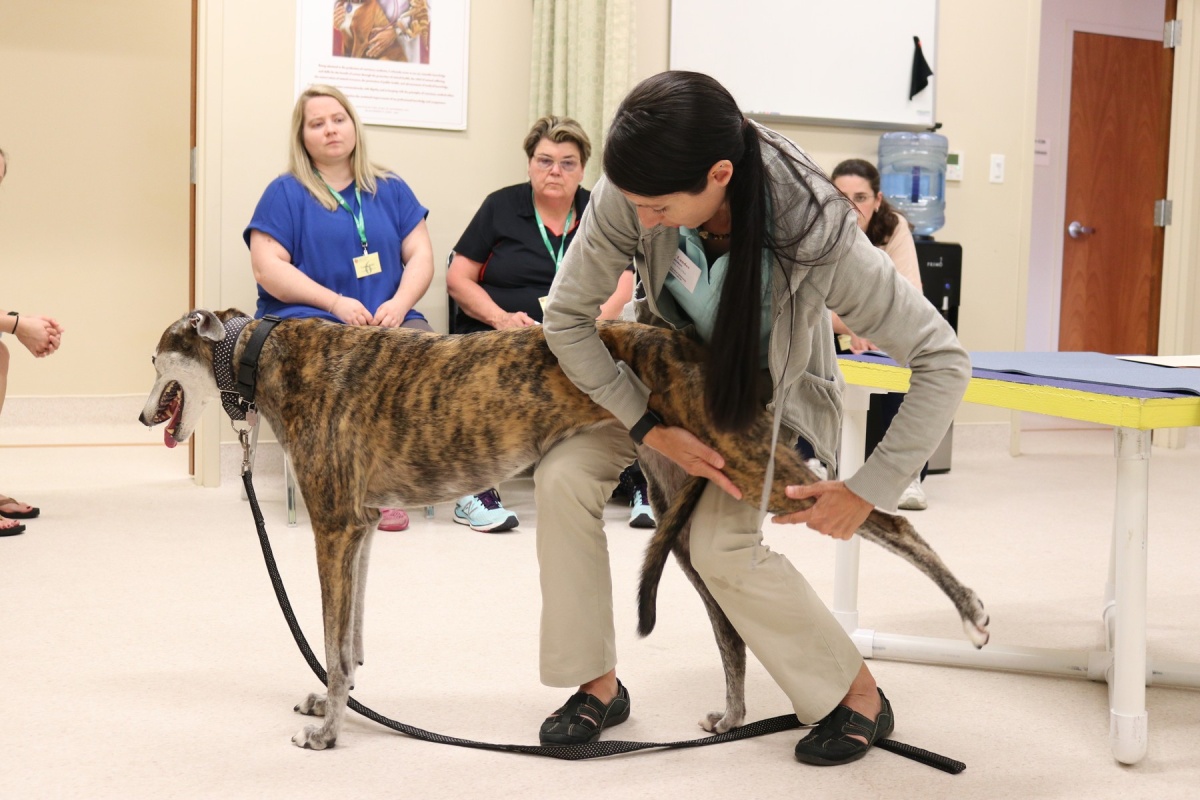
Healing with the Hands
Tui-na is a manual therapy that is one of the four branches of TCVM and uses Chinese medical theory as the basis for its application and actions. It was first used in the 16th-11th centuries BC and references to this treatment can be found in the Huang Di Nei Jing (Yellow Emperors Inner Classic, written in 475-221 BC). From a conventional medicine perspective, Tui-na can be thought of as corresponding to a combination of acupressure, conventional massage, and chiropractic techniques. It can be used to regulate the Channels, soothe joints and sinews, promote circulation of Qi and Blood, strengthen the immune system, and promote normal function of the Zang-Fu organs. Tui-na is most commonly used to treat acute and chronic musculoskeletal conditions and is also useful as a preventative medicine therapy because it promotes balance in the body. It can also be used in conjunction with and to enhance acupuncture and herbal treatments. Small animals, large animals, and exotic species all respond well to Tui-na, and it can be administered on animals that will not allow the insertion of acupuncture needles. It is safe and effective with no known side effects. Although veterinarians must receive specialized training in the techniques and applications of Tui-na, once mastered, several Tui-na techniques can be taught to caretakers for home treatments. Mo-fa (touching skin and muscle), Rou-fa (rotary kneading), Ca-fa (rubbing), Tui-fa (pushing), An-fa (pressing), Nie-fa (pinching), Dou-fa (shaking), Ba-shen-fa (stretching) and Cuo-fa (kneading) are techniques that caretakers can learn and use to accelerate the healing process and deepen the connection with their animals.

Course Overview
The Veterinary Tui-na course is a 36-hour course that certifies veterinarians in Veterinary Tui-na (Chinese Medical Manipulation) therapy. This course is hybrid, with online and on-site portions. The on-site portion is held in Rustenburg, South Africa. The course is for small animal veterinarians. Lectures and labs cover treatment for both small animals and horses. Hands-on learning is heavily emphasized in the Tui-na course, and wet labs take up more than half the course. In wet labs, students can practice Tui-na techniques on live animals, and they can choose to work on either small animals (cats and dogs) or horses.
Course Features
Learn another treatment option for patients sensitive to needles
Over 16 hours of intensive hands-on learning in wet lab with live animals
Enjoy the convenience of online learning in 36 total hours of hybrid courses
Receive a CVTP certification from Chi after completion of course requirements
Free life-time case consultation with TCVM experts
Veterinary Tui-na
Taught in English
For veterinarians & veterinary students only
36 hours
Prerequisites
Prerequisites
Students wishing to enroll in the Veterinary Tui-na course must have knowledge of TCVM and acupuncture through the completion of the first four veterinary acupuncture sessions from Chi or a veterinary acupuncture course from another accredited institution.
No semesters currently available
Certification
CVTP Certification
Students who complete the Certified Veterinary Tui-na (Chinese Medical Manipulation) course are eligible for the Certified Veterinary Tui-na Practitioner certification, endorsed by Chi University. The CVTP certification requirements are as follows:
Be a veterinarian
Completion of the Chi Certified Veterinary Tui-na Course
Pass the take-home exam
Submission of one veterinary Tui-na case report to be approved by Chi faculty
Please note that Chi cannot issue any certification to DVM students until their DVM has been obtained.
Instructors
Huisheng Xie
DVM, PhD
Dr. Xie has 41 years of clinical, teaching, and research experience in veterinary acupuncture and TCVM. He has trained over 10,000 veterinarians to practice TCVM worldwide. Dr. Xie’s education includes advanced training in veterinary medicine, veterinary acupuncture, and human acupuncture. Dr. Xie has authored 20 books and over 100 peer-reviewed papers. His textbooks, including Xie’s Veterinary Herbology, Xie’s Veterinary Acupuncture, and Traditional Chinese Veterinary Medicine-Fundamental Principles, have been used for TCVM training programs around the world. Dr. Xie continues to teach and develop educational courses and programs at Chi University, serves as a full clinical professor at the University of Florida’s College of Veterinary Medicine, and is an honorary professor at China Agricultural University, South China Agricultural University, and China Southwest University.
Read moreMichael Bartholomew
DVM, CVA, MSTCVM, CVCH, CVFT, CVTP
Dr. Michael Bartholomew earned his DVM from the University of Illinois in 2001. Between 2005 and 2009 he earned certifications in Veterinary Acupuncture, Tui-na, Food Therapy and Chinese Herbal Medicine from Chi University. He then went on to earn an Master of Science in TCVM from Chi 2016. He is currently an integrative practitioner at The Animal Hospital of Dunedin in beautiful Dunedin, Florida, and incorporates TCVM into his practice on a daily basis. He has treated pets across the United States and from around the world, including locations as far as Turkey, France, England and even Hong Kong. He has been published in several magazines, including Dog Fancy's Natural Dog and Dogs Naturally, and is the co-author of several chapters in Xie's Veterinary Herbology. Dr. Bartholomew also lectures on a regular basis, as he has been a lab assistant at Chi University since 2008 and became a formal MS program faculty member in 2016.
Cindy West
DVM, CVA, CVTP
Dr. West graduated from the University of Florida College of Veterinary Medicine in 1987. After completing a 15-month internship at Hollywood Animal Hospital, she practiced primarily conventional Western Medicine at her own small and exotic companion animal clinic in Plantation, Florida for 19 years. After selling her South Florida practice, she began to study TCVM at Chi. In 2008, after becoming certified in Veterinary Acupuncture and Tui-na by Chi, she opened her new practice, Alternative Veterinary Medicine, located just north of Tallahassee, Florida. She now practices primarily TCVM and integrated medicine for small and exotic companion animals. Due to the growing demand for holistic medicine, she has begun to practice TCVM for equine patients as well. She has recently completed the advanced acupuncture course for small animals, and currently serves as a lab instructor for the Small Animal Acupuncture course at Chi. She plans to expand her study of holistic medicine to include energy medicine in the near future. Her energy is renewed by relaxing with her critter family on her farm in South Georgia.
Terri Rosado
DVM, CVA, CTCVMP, CCRT, CVMMP
Dr. Terri Rosado holds certifications in all Traditional Chinese Veterinary Medicine branches. As an Assistant Professor at Chi University and the medical director of Chi Animal Hospital, Dr. Rosado is passionate about education, offering externships to Chi and veterinary school students, and inviting volunteers to experience small animal veterinary practice.
Ronald Koh
DVM, MS, DACVSMR, CVA, CCRP, CVMMP, CVCH, CVFT
Dr. Koh earned his veterinary degree in Taiwan and further honed his expertise at the University of Florida College of Veterinary Medicine, completing a specialty internship and a Master’s in acupuncture/integrative medicine. Subsequently, he has been teaching at Chi University and served as a clinical assistant professor at LSU School of Veterinary Medicine before his current role as the clinical associate professor and head of Integrative Medicine at UC Davis School of Veterinary Medicine. Certified in acupuncture, Chinese herbal therapy, Chinese food therapy, rehabilitation, and medical manipulation, Dr. Koh is also board certified in Veterinary Sports Medicine and Rehabilitation. He also holds the distinguished title of Charter Fellow with the American College of Veterinary Botanical Medicine. Dr. Koh is an internationally recognized speaker and mentor in the areas of rehabilitation, TCVM, and integrative medicine. He also has contributed to academic literature, penning book chapters and peer-reviewed articles on these areas. His clinical focus centers on integrative approaches to various health conditions to optimize clinical outcomes and quality of life, particularly concerning pain management, mobility issues, and chronic disorders.
Roselle Hartwigsen
BSc, (veterinary biology) BVSc, MSc (Companion animal clinical studies), CVA
Dr. Roselle Hartwigsen qualified as a veterinarian from the University of Pretoria in 2011. Thereafter she was certified as a Veterinary Acupuncturist in 2013 from the Chi Institute Europe. She spent the next couple of years working in private practice, integrating complimentary medicine especially acupuncture when treating patients. Her clients are found in South Africa, Botswana and Dubai. In 2016 she spent a year treating horses exclusively and bringing veterinary acupuncture to the horse racing industry in Gauteng.
Dr. Roselle has a passion for integrating complimentary veterinary medicine into daily veterinary care in South Africa. One way she tries to achieve this is by teaching veterinarians through the Complimentary Veterinary Medicine Group of South Africa (CVMG) and the Chi Institute.
Tatang Cahyono
DVM, CPN, CTCVMP, MSTCVM
Dr. Tatang Cahyono specializes in TCVM and works in the largest small animal clinic in Jakarta. Dr. Cahyono received his DVM in 2003 from Airlangga University in Indonesia. During his early professional career, he worked in the pharmaceutical industry. Later, he became certified and worked as a human acupuncturist. In 2012, he went to Chi to study Small Animal Acupuncture, Chinese Veterinary Herbal Medicine, Food Therapy, and Veterinary Tui-na. Dr. Cahyono is the Indonesian Board Director of WATCVM and an International Director of Chi.
Tamara Shearer
DVM, MSTCVM, CCRP, CVPP, CVA, CHPV, CTPEP
Dr. Tamara Shearer graduated from the Ohio State University with her Doctor of Veterinary Medicine Degree in 1986. She is certified in veterinary acupuncture, Chinese veterinary herbal medicine, veterinary tui-na, and veterinary food therapy through Chi. Dr. Shearer is internationally renowned for her work in animal hospice and palliative care. She is one of the leading veterinarians in the world who helped develop and specializes in hospice, palliative care and pain management.